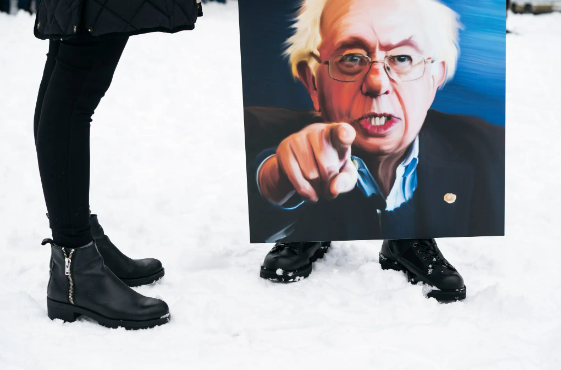
。。。托德·海斯勒/《纽约时报》
这篇文章由诺拉·费拉斯(Nora Fellas)撰写,她现在17岁,但写的时候只有16岁,是我们第六届年度学生社论大赛的前 12名获奖者之一,我们收到了10,509份参赛作品。
Lessons for 2020 Democratic Presidential Candidates, From a Soon-to-be First-Time Voter
I am one of more than five million people too young to vote today, but who will be old enough in 2020. I am 16, I run a political blog with over 100,000 followers, and I am offering some free lessons to candidates on how they can earn our votes.
Given the slim margin in the 2016 election, our votes could make all the difference. So listen up.
While young people have diverse views, Democrats focus on issues that matter to many of us, like gun control and climate change, making them more attractive than the presumptive Republican nominee, President Trump. The challenge for Democratic candidates is to distinguish themselves to capture the youth vote.
So what actually matters to us? It’s simple, but elusive: authenticity.
When politicians force relatability, they seem fake. Prior to her bid, Elizabeth Warren Instagram livestreamed and began by announcing to the camera, “I’m gonna get me a beer,” and then thanked her husband for being there, in their own house, as if it hadn’t all been scripted. One Boston Herald analyst criticized the image of the “multi-million-dollar Cambridge law professor poppin’ a brewski.” It’s not credible that Warren opened Instagram and decided to livestream of her own volition.
In 2016, Secretary Clinton and Trump both tried to appeal to young people. Trump used Twitter, and his statements were so unfiltered that they could only have come from him. Clinton’s messaging, however, felt phony. In a particularly cringey video, Clinton said, “Pokemon Go to the polls,” referencing the tween-trending app of that summer, Pokemon Go. It was clear that she had been fed that line and it felt condescending, suggesting youth votes could be earned by name-dropping a game.
This isn’t to say candidates shouldn’t appeal to young people — they must, because our votes can’t be taken for granted. In 2016, 18-29 year olds had the lowest turnout of any age group. The key difference between our generation and our parents’ is that we belong to the “Bernie or Bust” generation. 2016 revealed that we won’t choose between “the lesser of two evils”; if no candidate inspires us, we will just stay home.
This is why politicians need to appeal seriously to youth voters. Take Sanders: he is nearly 80, yet he is incredibly popular among young people. Why? Not because of his Instagram skills, but because he’s perceived as genuine — his politics haven’t changed.
To the 2020 candidates: the key to earning our vote isn’t pandering to us. Rather, we want to see that you genuinely care about the issues that matter to us. If you do that, you won’t need to worry about spreading your message on Instagram. We’ll do it for you.
Works Cited
“Clinton Drops a Pokemon Go Reference at Rally.” YouTube, uploaded by CNN, 14 July 2016.
“Elizabeth Warren Drinking a Beer on Instagram Live Gets Mixed Reactions.” YouTube, uploaded by CBS News, 2 Jan. 2019.
Ember, Sydney. “Bernie Sanders Begins 2020 Race With Some Familiar Themes and a New One: Himself.” The New York Times, 2 March 2019.
Fellas, Nora (@nastyfeminism). Instagram.
Graham, Michael. “Elizabeth Warren Pours a Cold One — on Image of Authenticity.” Boston Herald, 4 Jan. 2019.
Khalid, Asma. “Millennials Now Rival Boomers As A Political Force, But Will They Actually Vote?” NPR, 16 May 2016.
Martin, Joyce A., Brady E. Hamilton, Paul D. Sutton, Stephanie J. Ventura, Fay Menacker, and Martha L. Munson. “Births: Final Data for 2002.” National Vital Statistics Report, Centers for Disease Control and Prevention, 17 Dec. 2003.